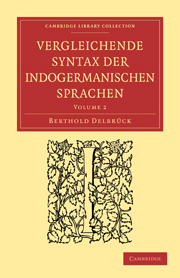Book contents
- Frontmatter
- Vorrede
- Inhaltsangabe
- Abkürzungen
- Kapitel XVI Tempora und Aktionen
- Kapitel XVII Die charakterisierten Präsensbildungen im Altindischen und Griechischen
- Kapitel XVIII Die aus einsilbigen Wurzeln gebildeten Formen (Präsentia und Aoriste)
- Kapitel XIX Die Formen aus Wurzeln auf o (mit o?)
- Kapitel XX Die Verba auf eiō
- Kapitel XXI Die indogermanischen Präsensaktionen im Germanischen und Slavischen
- Kapitel XXII Perfektivierung durch Verbindung mit Präpositionen
- Kapitel XXIII Das Perfektum
- Kapitel XXIV Die Aoriste
- Kapitel XXV Das Futurum
- Kapitel XXVI Mehrere Wurzeln zu einem Verbum vereinigt
- Kapitel XXVII Die Indikative im Arischen und Griechischen
- Kapitel XXVIII Die Indikative im Italischen, Germanischen, Litauischen, Slavisclien
- Kapitel XXIX Die Modi im Arischen und Griechischen
- Kapitel XXX Die Modi in den übrigen Sprachen
- Kapitel XXXI Die Genera Verbi im Arischen und Griechischen
- Kapitel XXXII Die Infinitive
- Kapitel XXXIII Partizipia und Verbaladjektiva
- Kapitel XXXIV Die Partikeln
- Index der Verbalformen
- Sach-Index
- Nachträge und Berichtigungen
Kapitel XXIII - Das Perfektum
Published online by Cambridge University Press: 05 August 2011
- Frontmatter
- Vorrede
- Inhaltsangabe
- Abkürzungen
- Kapitel XVI Tempora und Aktionen
- Kapitel XVII Die charakterisierten Präsensbildungen im Altindischen und Griechischen
- Kapitel XVIII Die aus einsilbigen Wurzeln gebildeten Formen (Präsentia und Aoriste)
- Kapitel XIX Die Formen aus Wurzeln auf o (mit o?)
- Kapitel XX Die Verba auf eiō
- Kapitel XXI Die indogermanischen Präsensaktionen im Germanischen und Slavischen
- Kapitel XXII Perfektivierung durch Verbindung mit Präpositionen
- Kapitel XXIII Das Perfektum
- Kapitel XXIV Die Aoriste
- Kapitel XXV Das Futurum
- Kapitel XXVI Mehrere Wurzeln zu einem Verbum vereinigt
- Kapitel XXVII Die Indikative im Arischen und Griechischen
- Kapitel XXVIII Die Indikative im Italischen, Germanischen, Litauischen, Slavisclien
- Kapitel XXIX Die Modi im Arischen und Griechischen
- Kapitel XXX Die Modi in den übrigen Sprachen
- Kapitel XXXI Die Genera Verbi im Arischen und Griechischen
- Kapitel XXXII Die Infinitive
- Kapitel XXXIII Partizipia und Verbaladjektiva
- Kapitel XXXIV Die Partikeln
- Index der Verbalformen
- Sach-Index
- Nachträge und Berichtigungen
Summary
Während ich in den vorhergehenden Kapiteln nur die Aktion des Präsens und des prasentischen Aonsts behandelt, die Darstellung des Indikativgebrauchs aber einem späteien Kapitel vorbehalten habe, seheint es mil nicht möglich, bei dem Peif. entsprechend zu verfahren. Denn die Entwickelung des Tempusbegriffs lässt sich von der Darstellung des Indikativgebrauchs nicht scheiden, ohne Zusammengehöriges auseinander zu reissen. Auch das Augmenttempus vom Perfektstamme, das sog. Plusquamperfektum, ist schon in diesem Kapitel zu erörtern, weil ohne eine solche Erörterung sich nicht klar machen lässt, wie sich schon in proethnischer Zeit von dem Perfektum ein Aorist abzweigen konnte. In dem Abschnitt über die Indikative wird dann auf dieses Kapitel zu verweisen sein.
Allgemeines
Giebt es ein besonderes intensives Perfektum?
Wir haben oben (S. 2) die Meinung der griechischen Grammatiker kennen gelernt, wonach das Perf. innerhalb der Sphäre der Vergangenheit das παραχ∈íμεvov bezeichnet. An sie haben die Grammatiker der Neuzeit angeknüpft, unter denen ich namentlich Butsmann hervorhebe, der sich Ausf. Sprachl. 2, 88 so ausdrückt: “Um sich dies (die Präsensbedeutung mancher Perfekta) richtig zu erklären, muss man erwägen, dass jedes Perfekt an sich schon, insofern es den aus dem vergangenen Ereignis erfolgten Zustand bezeichnet, ein wahres Präsens ist.
- Type
- Chapter
- Information
- Vergleichende Syntax der indogermanischen Sprachen , pp. 171 - 229Publisher: Cambridge University PressPrint publication year: 2010First published in: 1897



